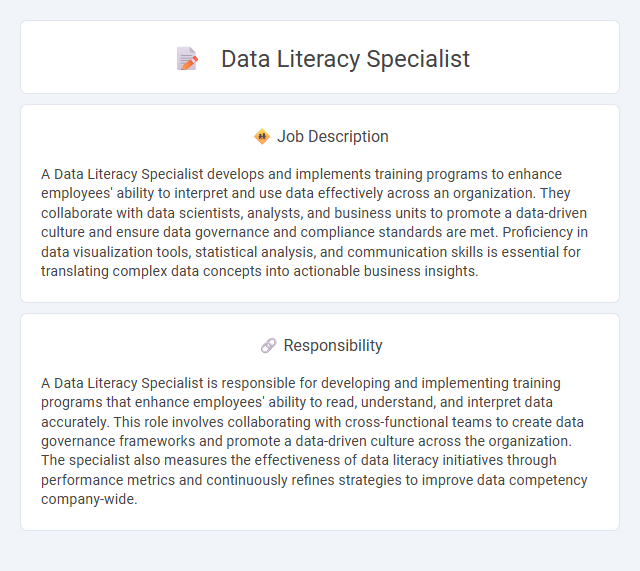
A Data Literacy Specialist develops and implements training programs to enhance employees' ability to interpret and use data effectively across an organization. They collaborate with data scientists, analysts, and business units to promote a data-driven culture and ensure data governance and compliance standards are met. Proficiency in data visualization tools, statistical analysis, and communication skills is essential for translating complex data concepts into actionable business insights.
Individuals with strong analytical thinking and a passion for data interpretation are likely suitable for a Data Literacy Specialist role. Those comfortable with communication and training may find themselves well-equipped to bridge gaps between data teams and non-technical staff. People who struggle with abstract concepts or lack interest in data analysis might face challenges in excelling in this position.
Qualification
Data literacy specialists require strong analytical skills, proficiency in data visualization tools such as Tableau or Power BI, and a deep understanding of statistical concepts. A background in data science, computer science, or related fields with certifications in data analysis or business intelligence enhances qualifications. Effective communication and training abilities are essential to help organizations improve data-driven decision-making across teams.
Responsibility
A Data Literacy Specialist is responsible for developing and implementing training programs that enhance employees' ability to read, understand, and interpret data accurately. This role involves collaborating with cross-functional teams to create data governance frameworks and promote a data-driven culture across the organization. The specialist also measures the effectiveness of data literacy initiatives through performance metrics and continuously refines strategies to improve data competency company-wide.
Benefit
Data literacy specialists are likely to enhance organizational decision-making by promoting better understanding and effective use of data across teams. Their expertise could improve data quality and reduce errors, leading to more reliable insights and strategic advantages. Companies might experience increased productivity and innovation as employees become more confident in interpreting and applying data-driven information.
Challenge
Data literacy specialists likely face the challenge of bridging the gap between complex data concepts and diverse audience comprehension levels. They probably encounter difficulties in designing training programs that effectively address varying skill sets within organizations. Adapting communication strategies to keep pace with rapidly evolving data tools and methodologies may also be a significant hurdle.
Career Advancement
A Data Literacy Specialist plays a crucial role in enhancing an organization's ability to interpret and utilize data effectively, driving informed decision-making across departments. Career advancement in this field often leads to roles such as Data Strategist, Chief Data Officer, or Analytics Manager, where strategic oversight and leadership in data governance are key. Mastery in data visualization tools, statistical analysis, and strong communication skills significantly accelerate progression and value within data-driven enterprises.
 kuljobs.com
kuljobs.com